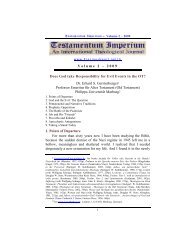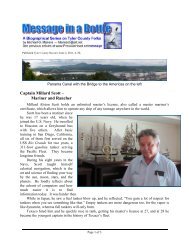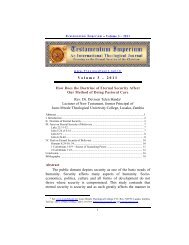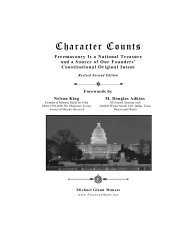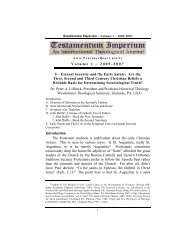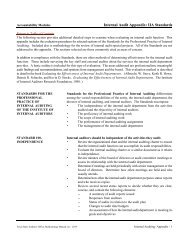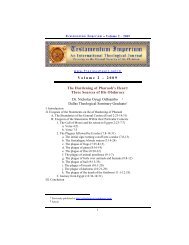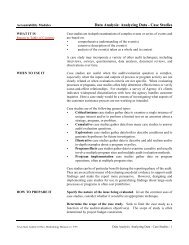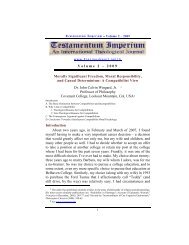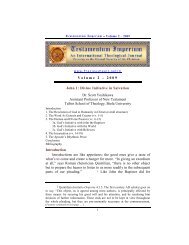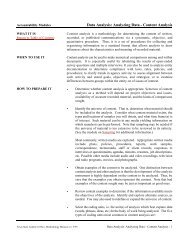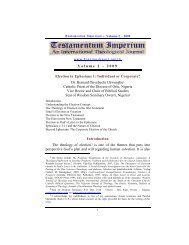Closer Look. Freemasonry - Freemasonry Watch
Closer Look. Freemasonry - Freemasonry Watch
Closer Look. Freemasonry - Freemasonry Watch
Create successful ePaper yourself
Turn your PDF publications into a flip-book with our unique Google optimized e-Paper software.
at<strong>Freemasonry</strong>During the annual session of the Southern Baptist Convention(SBC), June 15-17, 1993, the messengers overwhelminglyapproved a report on <strong>Freemasonry</strong>. This action recognized themany charitable endeavors of <strong>Freemasonry</strong>. It also acknowledgedthat “many outstanding Christians and Southern Baptistsnow are, and in the past have been Masons.” 1 For the first timein the history of the SBC, however, the Convention concluded,“many tenets and teachings of <strong>Freemasonry</strong> are not compatiblewith Christianity or Southern Baptist doctrine.” 2 The reportaccepted by the Convention identified eight tenets and teachingsof <strong>Freemasonry</strong> that it concluded were not compatible withChristianity. 3First Incompatibility: The prevalent use of offensive concepts,titles, and terms such as “Worshipful Master” for the leader ofa lodge; references to their buildings as “mosques,”“shrines,” or“temples”; and the use of words such as “Abaddon” and “Jah-Bul-On,” 4 the so-called secret name of God.To many, theseterms are not only offensive but sacrilegious.Biblical Response: The so-called secret name of God illustratesthe offensive nature of the above terms for Christians.AlbertPike, one of the most influential Masonic writers, explained thefirst two syllables of the secret name in his discussion of the oldFrench rituals of <strong>Freemasonry</strong>:This is probably Jabulum, incorrectly copied; which, as Ihave shown, meant ‘the product of, that which proceeded,issued or emanated from Om.’If correctly written, it is compounded of … Yu or Yah-u, …Baal or Bal or Bel, and Om, thus combining the names of theHebrew, Phoenician and Hindu Deities, to indicate that theyare in reality the same. In some old rituals it is Jabulum. 5Many leaders of <strong>Freemasonry</strong> confuse pagan deities with thetrue God of the Bible.The Christian Scriptures never representpagan deities as simply different representations of the one trueGod.The Bible rejects all pagan deities as false gods and goddesses.Exodus 20:4-5 states:“You shall not make for yourself anidol in the form of anything in heaven above or on the earthbeneath or in the waters below.You shall not bow down tothem or worship them; for I, the Lord your God, am a jealousGod, punishing the children for the sin of the fathers to thethird and fourth generation of those who hate me.”The Biblealso rejects the idea that idolaters worship the true God butknow Him by a different name. Israel used the correct personalname for God, yet God rejected their worship because of theiruse of an idol.He took what they handed him and made it into an idol castin the shape of a calf, fashioning it with a tool.Then theysaid,“These are your gods, O Israel, who brought you up outof Egypt.”When Aaron saw this, he built an altar in front ofthe calf and announced,“Tomorrow there will be a festivalto the LORD.” So the next day the people rose early and sacrificedburnt offerings and presented fellowship offerings.Afterward they sat down to eat and drink and got up toindulge in revelry.Then the LORD said to Moses,“Go down,because your people, whom you brought up out of Egypt,have become corrupt.They have been quick to turn awayfrom what I commanded them and have made themselvesan idol cast in the shape of a calf.They have bowed downto it and sacrificed to it and have said,‘These are your gods,O Israel, who brought you up out of Egypt.’”“I have seen these people,” the LORD said to Moses,“andthey are a stiff-necked people. Now leave me alone so thatmy anger may burn against them and that I may destroythem.Then I will make you into a great nation” (Ex. 32:4-10). 6Non-Christian religions recognize many different gods and goddesses,but none of these are a representation of the true God ofthe Bible.All pagan deities are false gods and must be rejectedby Christians.The gods and goddesses of the non-Christian religionsare different in nature and character from the biblicalGod.The differences are far greater and more significant thanthe terminology or name used to refer to God. No Christian
should have any part in a ritual that honors or glorifies a pagandeity.The 31st degree of the Scottish Rite Southern Jurisdiction isespecially troubling for Christians because of the honor andglory it attributes to Egyptian deities.The following quotes arefrom the official Masonic commentary on the Scottish Ritedegrees:The second section takes place in a re-creation of the Courtof the Dead in Egyptian mythology, a place where judgmentis rendered on the worthiness of a recently deceased manto enter into the kingdom of the gods.This section of theritual relies heavily on The Book of the Dead.The candidate is brought into the Court of the Dead to bejudged for actions while living and to determine if hedeserves to dwell among the gods. His escort is Horus. Isis,Horus’ mother, speaks first, inquiring whose ka has come tobe judged.Through Horus, the candidate claims to have led the mostvirtuous of lives.The gods express their hope that he speaksthe truth.They ask him to approach the balance and standnear the body that was his in life.Isis now directs the candidate to the altar of the great godKhem, the source of life. Here she inquires about the honestyof the deceased through six questions.Thoth againrecords the answers.The answers to all of the specific questions before the altarsof various deities are now thrown upon the balance, makingthe pans nearly equal.Osiris, having once been a man and subject to the passionsand weaknesses of human existence, knows that the othergods cannot appreciate human fallibility. He renders thefinal judgment—this man is worthy of admittance into therealm of everlasting light and rest and peace. 7The above reference to the Egyptian god Osiris goes so far as toattribute to him the same qualities and preeminence that theBible assigns to Christ Jesus. 8 Any participation by Christians insuch rituals (even by proxy) is inexcusable. Joshua 23:7 states:“Do not associate with these nations that remain among you; donot invoke the names of their gods or swear by them.”Second Incompatibility: The use of archaic, offensive ritualsand so-called “bloody oaths” or “obligations,” among thesebeing that promised by the Entered Apprentice:“All this I most solemnly and sincerely promise and swear,. . . binding myself under no less penalty than that of havingmy throat cut from ear to ear, my tongue torn out byits roots, and buried in the sands of the sea, at low watermark, where the tide ebbs and flows twice in twenty-fivehours, should I, in the least, knowingly or wittingly violateor transgress this my Entered Apprentice obligation.”Or that of the Fellow Craft degree:“All this I most solemnly and sincerely promise and swear,. . . binding myself under no less penalty than that of havingmy left breast torn open, my heart plucked fromthence, and given to the beast of the field and the birds ofthe air as prey, should I, in the least, knowingly or wittingly,violate or transgress this my Fellow Craft obligation.”Or that of the Master Mason:“All this I most solemnly and sincerely promise and swear,. . . binding myself under no less penalty than that of havingmy body severed in two, my bowels torn from thenceand burned to ashes, and these scattered before the fourwinds of heaven, that no more remembrance might behad among men or Masons of so vile a wretch as I shouldbe, should I, in the least, knowingly or wittingly violate ortransgress this my Master Mason obligation. So help meGod and keep me steadfast.”Or that of other advanced degrees with required ritualsconsidered by many to be pagan and incompatible withChristian faith and practice.Even though these oaths, obligations, and rituals may ormay not be taken seriously by the initiate, it is inappropriatefor a Christian to “sincerely promise and swear,”with a hand on the Holy Bible, any such promises oroaths, or to participate in any such pagan rituals. 9Biblical Response: Both Jesus and the apostle James taughtthat Christians should avoid the kind of extravagant oaths foundin the rituals of <strong>Freemasonry</strong>. Christians should simply let their“yes” be “yes,” and their “no” mean “no.” In Matthew 5:34-37,Jesus taught the following:
But I tell you, Do not swear at all: either by heaven, for it isGod’s throne; or by the earth, for it is his footstool; or byJerusalem, for it is the city of the Great King.And do notswear by your head, for you cannot make even one hairwhite or black. Simply let your ‘Yes’ be ‘Yes,’ and your ‘No,’‘No’; anything beyond this comes from the evil one.Likewise, in his epistle, James wrote:“Above all, my brothers, donot swear—not by heaven or by earth or by anything else. Letyour “Yes” be yes, and your “No,” no, or you will be condemned”(Jas. 5:12).The oaths required by <strong>Freemasonry</strong> are far worse than theexamples the New Testament warns its readers against making.The Entered Apprentice swears under no fewer penalties thanthat of having his “throat cut from ear to ear,” and his “tonguetorn out by its roots, and buried in the sands of the sea.” In theFellow Craft degree, he swears under no less penalty than thatof having his “left breast torn open,” his “heart plucked fromthence” and “given to the beast of the field and the birds of theair as prey.”The candidate for the Mason degree swears under nofewer penalties than that of having his “bowels torn from thenceand burned to ashes, and these scattered before the four windsof heaven.”Some Masons claim that the candidates for the degrees do nottake these oaths seriously and, therefore, the oaths are compatiblewith Christian teaching. However, the Bible warns that oathsshould be taken seriously and not given rashly. Leviticus 5:4says,“Or if a person thoughtlessly takes an oath to do anything,whether good or evil—in any matter one might carelessly swearabout—even though he is unaware of it, in any case when helearns of it he will be guilty.”Third Incompatibility: The recommended readings, in pursuanceof advanced degrees, of religions and philosophies,which are undeniably pagan and/or occultic, such as much ofthe writings of Albert Pike, Albert Mackey, Manly Hall, RexHutchens, W.L.Wilmshurst, and other such authors; along withtheir works, such as Morals and Dogma, A Bridge to Light, AnEncyclopaedia of <strong>Freemasonry</strong>, and The Meaning of Masonry.Biblical Response: Several of these Masonic writers deny theuniqueness of Jesus Christ. For example, Rex Hutchens wrote:The purpose of teaching the concept of a Messiah in<strong>Freemasonry</strong> is to point out its near universality in thewell–developed religions of the ancient world.We see referencesto Dionysius of the Greeks, Sosiosch of the Persians,Krishna of the Hindus, Osiris of the Egyptians, Jesus of theChristians.The purpose of these varying cultures’ messiahswas to find in human form a source of intercession withDeity; in particular one who, as a human, had been temptedand suffered the daily pangs of life and so could be expectedto possess a particular sympathy and understanding; in aword, the messiahs expressed hope. 10In addition, some of these writers confuse false pagan beliefswith the teaching of Christianity. Albert Pike, in the followingquote, confused the Christian Trinity with the Hindu UniversalSoul:“Behold the True Masonic Trinity; the Universal Soul, theThought in the Soul, the Word, or Thought expressed; the ThreeIn One, of a Trinitarian Ecossais.” 11According to Hutchens, the following pagan deities are mentionedin the ritual of the 31st degree of Scottish Rite<strong>Freemasonry</strong>, Southern Jurisdiction. (31st degree) “The Egyptiandeities present in the hall are: (1) Osiris: the Lord and Judge ofthe dead; (2) Atum: called the ‘Father of Souls’; (3) Ma: goddessof Truth and Justice whose image weighs upon one side of thebalance; (4) Thoth: Scribe of the gods; (5) Anubis: Conductor ofSouls; son of Osiris by his sister Nephthys; (6) Horus: son ofOsiris, who presents the deceased to his father; (7) Isis: wife andsister of Osiris, mother of Horus; (8) Nephthys: sister of Isis andOsiris, mother of Anubis by Osiris; (9) Four sons of Horus:Kebhsenuf,Tua–mutef, Hapi and Amset. 12Pike even compared the Bible with the occultic Kabalah, whichhe apparently considered superior to the Bible.All truly dogmatic religions have issued from the Kabalahand return to it: everything scientific and grand in the religiousdreams of all the illuminati, Jacob Boehme,Swedenborg, Saint-Martin, and others, is borrowed from theKabalah; all the Masonic associations owe to it their Secretsand their Symbols.The Kabalah alone consecrates the alliance of the UniversalReason and the Divine Word; it establishes, by the counterpoisesof two forces apparently opposite, the eternal balanceof being; it alone reconciles Reason with Faith, Powerwith Liberty, Science with Mystery; it has the keys of thePresent, the Past, and the Future.The Bible, with all the allegories it contains, expresses, in an
incomplete and veiled manner only, the religious science ofthe Hebrews. 13The SBC Report on <strong>Freemasonry</strong> correctly identifies these “recommendedreadings” as “undeniably pagan and/or occultic.” 14Fourth Incompatibility: The reference to the Bible placed onthe altar of the lodge as the “furniture of the lodge,” comparingit to the square and compass rather than giving it thesupreme place in the lodge.Biblical Response: Albert Pike identified the Bible as part ofthe furniture of the lodge in his book Morals And Dogma OfThe Ancient And Accepted Scottish Rite Of <strong>Freemasonry</strong>. Hewrote:The Holy Bible, Square, and Compasses, are not only styledthe Great Lights in Masonry, but they are also technicallycalled the Furniture of the Lodge; and, as you have seen, it isheld that there is no Lodge without them.This has sometimesbeen made a pretext for excluding Jews from ourLodges, because they cannot regard the New Testament as aholy book.The Bible is an indispensable part of the furnitureof a Christian Lodge, only because it is the sacred bookof the Christian religion.The Hebrew Pentateuch in aHebrew Lodge, and the Koran in a Mohammedan one,belong on the Altar; and one of these, and the Square andCompass, properly understood, are the Great Lights bywhich a Mason must walk and work. 15<strong>Freemasonry</strong> has no commitment to the Bible as the uniqueWord of God. It happily substitutes non-Christian scriptureswhen Christians are not the majority of a lodge.Fifth Incompatibility: The prevalent use of the term “light,”which some may understand as a reference to salvationrather than knowledge or truth.Biblical Response: In commenting on the Christian interpretationof the Blue degrees in <strong>Freemasonry</strong>, Pike wrote:Notwithstanding the death of the Redeemer, man can besaved only by faith, repentance, and reformation.Having repented and reformed, and bound himself to theservice of God by a firm promise and obligation, the light ofChristian hope shines down into the darkness of the heartof the humble penitent, and blazes upon his pathway toHeaven.And this is symbolized by the candidate’s beingbrought to light, after he is obligated, by the WorshipfulMaster, who in that is a symbol of the Redeemer, and sobrings him the light, with the help of the brethren, as Hetaught the Word with the aid of the Apostles. 16In the above quote, the concepts of light and salvation areclosely related.This quote also reveals that many Masonic writersinclude reformation (good works) as one of the requirementsfor salvation. However, the Bible clearly states that goodworks are not a requirement for salvation. 17Sixth Incompatibility: The implication that salvation may beattained by one’s good works, implicit in the statement foundin some Masonic writings that “Masonry is continuallyreminded of that purity of life and conduct which is necessaryto obtain admittance into the Celestial Lodge above where theSupreme Architect of the Universe presides.” Even thoughmany Masons understand that the “purity of life and conduct”can only be achieved through faith in Jesus Christ, others maybe led to believe they can earn salvation by living a pure lifewith good conduct.Biblical Response: According to Pike, the 25th degree “...teaches the necessity of reformation as well as repentance, as ameans of obtaining mercy and forgiveness, . . .” 18 In his commentaryon the 27th degree, Hutchens wrote:“Constans refuses themonk’s arguments, trusting in a God of love who will recognizehis honor and service to others as a noble path of salvation.” 19Likewise, in concerning the 31st degree, Hutchens stated:“Thecandidate is brought into the Court of the Dead to be judged foractions while living and to determine if he deserves to dwellamong the gods. His escort is Horus. Isis, Horus’ mother, speaksfirst, inquiring whose ka has come to be judged.” 20The teaching that meritorious deeds can make one acceptableto God is common in many false religions.The Bible, however,warns that there is no deed that can make a sinner acceptableto God. Only the grace of God that comes through faith in JesusChrist can save those under the judgment of sin.The addition ofworks to faith as a requirement of salvation is contrary to theteaching of the Bible.The following Scriptures illustrate this:Romans 3:28:“For we maintain that a man is justified by faithapart from observing the law.” Romans 4:4-5:“Now when a manworks, his wages are not credited to him as a gift, but as an obligation.However, to the man who does not work but trusts God
who justifies the wicked, his faith is credited as righteousness.”Romans 11:6:“And if by grace, then it is no longer by works; if itwere, grace would no longer be grace.” Ephesians 2:8-9:“For it isby grace you have been saved, through faith—and this not fromyourselves, it is the gift of God—not by works, so that no onecan boast.”Titus 3:5:“He saved us, not because of righteousthings we had done, but because of his mercy. He saved usthrough the washing of rebirth and renewal by the Holy Spirit.”Seventh Incompatibility: The heresy of universalism (thebelief all people will eventually be saved), which permeatesthe writings of many Masonic authors, which is a doctrineinconsistent with New Testament teaching.Biblical Response: Many Masonic writings can be interpretedas endorsing universalism. Pike wrote,“It is the fine dream of thegreatest of the Poets, that Hell, become useless, is to be closed atlength, by the aggrandizement of Heaven; that the problem ofEvil is to receive its final solution, and Good alone, necessaryand triumphant, is to reign in Eternity.” 21Even more prominent in <strong>Freemasonry</strong> is the false teaching ofinclusivism, the belief that followers of non-Christian religionswill also be saved. <strong>Freemasonry</strong> holds out the promise of salvationto all worthy Masons regardless of the deity they worship.The Muslim or Hindu member of the lodge is on the same spirituallevel as the believer in Jesus Christ.According to Hutchens,“Masonry is tolerant, even supportive, of the most diverse religiousbeliefs.” 22Pike likewise argued that no religion can claim to have exclusivityto the truth, nor can any religion claim to be superior toanother.Toleration, holding that every other man has the same rightto his opinion and faith that we have to ours; liberality, holdingthat as no human being can with certainty say, in theclash and conflict of hostile faiths and creeds, what is truth,or that he is surely in possession of it, so every one shouldfeel that it is quite possible that another equally honest andsincere with himself, and yet holding the contrary opinion,may himself be in possession of the truth, and that whateverone firmly and conscientiously believes, is truth, to him.” 23Inclusivism denies the teaching of the New Testament that onlythose who place their faith in Jesus Christ will be saved.The followingpassages teach this biblical truth: John 3:36:“Whoeverbelieves in the Son has eternal life, but whoever rejects the Sonwill not see life, for God’s wrath remains on him.” John 14:6:“Jesus answered,‘I am the way and the truth and the life. No onecomes to the Father except through me.’”Acts 4:12:“Salvation isfound in no one else, for there is no other name under heavengiven to men by which we must be saved.” First Corinthians3:11:“For no one can lay any foundation other than the onealready laid, which is Jesus Christ.” First Timothy 2:5:“For there isone God and one mediator between God and men, the manChrist Jesus.” First John 5:12:“He who has the Son has life; hewho does not have the Son of God does not have life.”Eighth Incompatibility: The refusal of most lodges (althoughnot all) to admit for membership African-Americans.Biblical Response: The Bible teaches that all men and womenare created in the image of God. Genesis 1:27 says,“So God createdman in his own image, in the image of God he created him;male and female he created them.”According to Genesis 9-11, allthe races of humanity scattered throughout the world are madein the image of God. For example, Genesis 9:6 states,“Whoeversheds the blood of man, by man shall his blood be shed; for inthe image of God has God made man.”The context (Genesis 10-11) reveals that this prohibition applies to all of the races ofhumanity scattered throughout the world.The New Testament reveals that Jesus rejected the racism of Hisday. John 4:9 indicates that Jesus discarded the racial prejudicesof the Jews towards the Samaritans.“The Samaritan woman saidto him,‘You are a Jew and I am a Samaritan woman. How canyou ask me for a drink?’ (For Jews do not associate withSamaritans.)”The apostle Peter, who struggled with the sin ofracism throughout his life, stated in Acts 10:28,“You are wellaware that it is against our law for a Jew to associate with aGentile or visit him. But God has shown me that I should notcall any man impure or unclean.” Racism should be rejectedwherever it is found, whether it is discovered in the lodge or inthe church.Summary Statement on <strong>Freemasonry</strong>There are eight major concerns that the Southern BaptistConvention has expressed about the teachings and practices of<strong>Freemasonry</strong>.These are:(1) <strong>Freemasonry</strong> uses offensive, non-biblical, and blasphemousterms relating to God.
(2) <strong>Freemasonry</strong> insists on the use of “bloody oaths” or obligations,which are strictly forbidden by the Bible (cf. Matt.5:34-37).(3) <strong>Freemasonry</strong> urges that occultic and/or pagan readings beused, and that their teachings be appropriated in interpretingsuch concepts as the Trinity.(4) <strong>Freemasonry</strong> includes the Bible as part of the “furniture ofthe lodge,” but only as an equal with non-Christian symbolsand writings.(5) <strong>Freemasonry</strong> misuses the term “light” to refer to moral “reformation”as a means to salvation.(6) <strong>Freemasonry</strong> teaches that salvation may be attained by “goodworks” and not through faith in Christ alone.(7) <strong>Freemasonry</strong> advocates in many of its writings the non-biblicalteachings of universalism.(8) In some of its lodges, <strong>Freemasonry</strong> discriminates against nonwhites.While it is clear that some Christians, moral persons, and outstandinggovernment leaders have been and are members of theFreemasonic movement, several points of the lodge’s teachingsare non-biblical and non-Christian. And, while <strong>Freemasonry</strong>encourages and supports charitable activities, it contains bothmultireligious and inclusivistic teachings that are not Christianin its religious instruction.Taking the above into consideration, and being consistent withour denomination’s historic deep conviction regarding both thepriesthood of the believer and the autonomy of the localchurch, we recommend that each individual Baptist, as well aseach congregation, carefully review the issues of the teachingsand practices of <strong>Freemasonry</strong>. Since, in the final analysis, theBible alone is the only guide for faith and practice, issues relatedto <strong>Freemasonry</strong> and any other fraternal organization, especiallysecret societies, must be evaluated only in light of the plumbline of Scripture.The divinity and lordship of Christ, the substitutionaryatonement of Christ, and salvation by grace through faithare foundational and nonnegotiable doctrines and the teachingsof any organization or society in contradiction to such biblicaltenets must be evaluated accordingly. It is, therefore, the duty ofevery Christian to resist and avoid false teachings to speak thetruth in love and to embrace only those doctrines which arerevealed in the inerrant Scripture, the Bible (see Matt. 7:24-27;John 7-10; 1 Cor. 10:14; Jude 3).All Scripture quotations are taken from the Holy Bible, New InternationalVersion. Copyright 1973, 1978, 1984 by International Bible Society. Used by permission.Notes01. Annual of the Southern Baptist Convention, 1993 (Nashville: ExecutiveCommittee, Southern Baptist Convention, 1993), p. 224.02. Ibid., p. 225.03. Ibid., pp. 225-227 lists the following eight tenets of incompatibility.04.This word has several alternative spellings.05.Albert Pike, The Book of the Words (Kila, Mont.: Kessinger Publishing Co.,n.d.), p. 151.While some Masons may disagree with Pike’s explanation of thesecret name for God they cannot deny the tremendous influence of Pikeupon <strong>Freemasonry</strong> in the United States.A reading of A Bridge To Light (anofficial publication of the Scottish Rite, Southern Jurisdiction) reveals thatmany modern Masonic leaders also confuse the God of the Bible with pagandeities. See A Bridge To Light, pp. 31, 120, 139.66.The use of the word LORD with all capital letters indicates that the personalname of the God of Israel is used in the Hebrew text..007. Rex R. Hutchens, A Bridge To Light (Washington, D.C.:The Supreme Council,1988), p. 299-302.08. See Hebrews 4:15.09. Annual of the Southern Baptist Convention, 1993, p. 226.10. Hutchens, A Bridge To Light, pp. 112-113.11.Albert Pike, Morals and Dogma of the Ancient and Accepted Scottish Rite of<strong>Freemasonry</strong> (Richmond,Va.: L.H. Jenkins, Inc., 1942), p. 575.12. Hutchens, A Bridge To Light, p. 300.13. Pike, Morals and Dogma, p. 744.14. Annual of the Southern Baptist Convention, 1993, p. 226.15. Pike, Morals and Dogma, p. 11.16. Ibid., p. 639, emphasis added.17. See Romans 3:28; 4:4-5; 11:6; Ephesians 2:8-9;Titus 3:5.Also see the discussionin the biblical response concerning the sixth incompatibility.18. Pike, Morals and Dogma, p. 435.19. Hutchens, A Bridge To Light, p. 243.20. Ibid., pp. 300-01.21. Pike, Morals and Dogma, p. 847.22. Hutchens, A Bridge To Light, p. 67.23. Pike, Morals and Dogma, p. 160.4200 North Point Pkwy.Alpharetta, GA 30022-4176A Southern Baptist Convention agency supported by the Cooperative Programand the Annie Armstrong Easter Offering ®For general information, call (770) 410-6000, or visit www.namb.net; to ordermaterials, call Customer Service Center, 1 800 448-8032, or fax, (615) 251-5983e-mail: interfaith@namb.netWeb site: www.namb.net0840085923/5M/5-00



